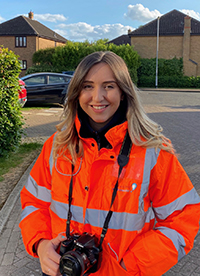 Five learnings from my first 100 days in internal comms
Five learnings from my first 100 days in internal comms
3rd June, 2020
I’m Charlotte, 23-years-old and living in Cambridgeshire. I’ve been working in internal comms for eight months now. After finishing my Geography degree (and doing what any good Geography graduate should; spending a few months travelling the world), I began my search for a role in communications. What appealed to me was the huge variety – I loved the sound of a profession that invites creativity, is constantly evolving and has scope for progression. In September 2019 I began my role as an internal communications executive on a development plan – I’m studying the CIPR Internal Communication Certificate with PR Academy whilst working. I’m finding it a great mixture of learning theory and best practice, whilst also being able to apply what I learn in a corporate setting and benefit from on-the-job training.
In my first 100 days in comms, here’s what I’ve learnt:
1. Know your audience.
Having the opportunity to get out and get to know the workforce whilst I was new was so beneficial – not only did I learn more about the company, its values and culture, but I was able to form productive working relationships with a range of people.
This has been particularly useful to better understand the operational workforce at my utility company - I really got a flavour of a typical day for field-based staff. A key takeaway from this was learning how valuable and well-used team WhatsApp group chats are. Because of this, we’ve been able to create and implement WhatsApp broadcast messages as a way for managers to cascade important updates to their teams – key messages are put on a PowerPoint slide, with visual aids, and then saved as a JPEG, which can easily be shared around WhatsApp chats.
2. Don’t be afraid to try new things.
Coming from an academic background, I’m was of the mind-set that there’s always a best way to do something, but simply, there isn’t. Different content, channels and styles work for different situations, groups and times. Through trial and error, myself and my team have worked to establish channels that work for our audience and content they’re engaged in. Our findings indicate visually led content, available on mobiles tends to get the highest view, click and engagement rates.
This open mindset has become particularly important with the current Covid-19 pandemic, which prompted a huge organisational shift and the need to communicate quickly and effectively.
3. Be led by research.
It’s been drilled into me by my manager to evaluate, evaluate, evaluate. Not just that but evaluate the outcomes instead of only outputs. It really does provide a clear indication of the type of comms your audience want to see. My team has a monthly evaluation report submitted to the senior leadership team, this helps us review our work over the previous month – take pride in what’s been a success, and consider what we can learn for the future.
4. Take every opportunity to learn.
This is been vital to me – learning the company, it’s visions and goals and also learning best-practice in the comms profession.
Learning from my colleagues by asking questions (so many questions), listening and watching how they work. This has been extremely useful for developing technical skills with video editing and photography.
Teaching from within my company – induction days were great opportunities to gain a better understanding of the history, current state and future aims of the company, network with colleagues and learn about the industry. My company also offers ‘lunch and learn’ sessions, which have really interesting and allow me to get a holistic understanding of the industry.
Stay up to date with the industry – I’ve signed up for monthly newsletters, podcasts and blog posts of key influencers within the field. I like seeing what works elsewhere, what ideas are floating and the newest data to inform our field.
External teaching – I’m lucky enough to be enrolled on the CIPR Internal Communication Certificate as part of my development plan, but I’ve also attended a number of conferences and workshops to learn best practice, theory and network.
5. Act confident, even if you don’t feel it.
This is probably a recurring theme for any new job or role, but at first (and less so now), I felt horrendously out of my depth. Every meeting I went to, conference call I was on, or stakeholder I was going to meet, terrified me. I would have to plan what I wanted to say and run it over in my head again and again. But honestly, I don’t think anyone noticed. It’s an internal struggle, and the more I just try to exude confidence, I find the less I have to try – it just starts to feel natural. Taking time out to measure and review success also helps with this and makes me realise I am learning, gaining skills and becoming more confident in what I do.
